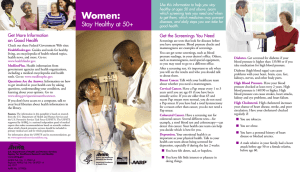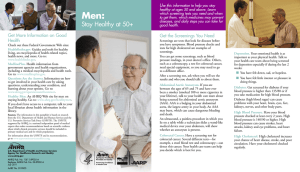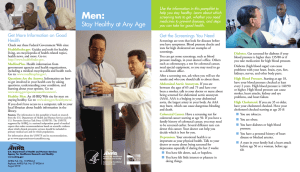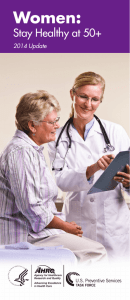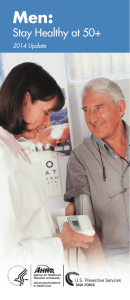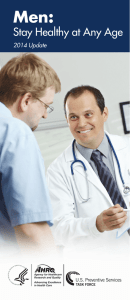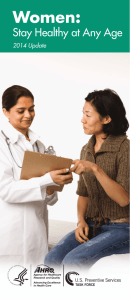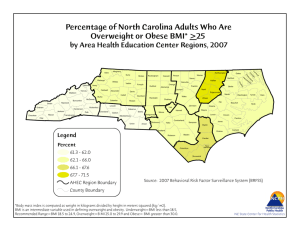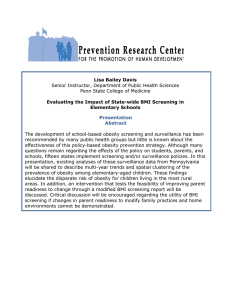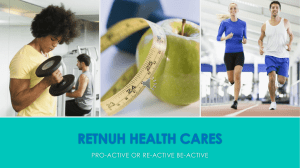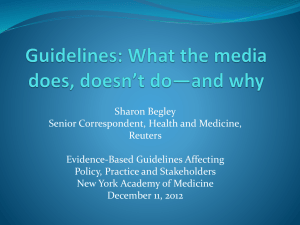Women: Stay Healthy at Any Age Get More Information
advertisement
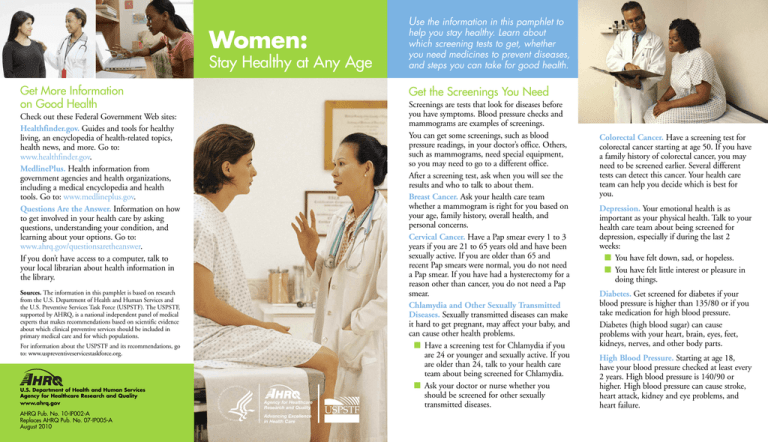
Use the information in this pamphlet to Women: Stay Healthy at Any Age Get More Information on Good Health Check out these Federal Government Web sites: Healthfinder.gov. Guides and tools for healthy living, an encyclopedia of health-related topics, health news, and more. Go to: www.healthfinder.gov. MedlinePlus. Health information from government agencies and health organizations, including a medical encyclopedia and health tools. Go to: www.medlineplus.gov. Questions Are the Answer. Information on how to get involved in your health care by asking questions, understanding your condition, and learning about your options. Go to: www.ahrq.gov/questionsaretheanswer. If you don’t have access to a computer, talk to your local librarian about health information in the library. Sources. The information in this pamphlet is based on research from the U.S. Department of Health and Human Services and the U.S. Preventive Services Task Force (USPSTF). The USPSTF, supported by AHRQ, is a national independent panel of medical experts that makes recommendations based on scientific evidence about which clinical preventive services should be included in primary medical care and for which populations. For information about the USPSTF and its recommendations, go to: www.uspreventiveservicestaskforce.org. U.S. Department of Health and Human Services Agency for Healthcare Research and Quality www.ahrq.gov AHRQ Pub. No. 10-IP002-A Replaces AHRQ Pub. No. 07-IP005-A August 2010 help you stay healthy. Learn about which screening tests to get, whether you need medicines to prevent diseases, and steps you can take for good health. Get the Screenings You Need Screenings are tests that look for diseases before you have symptoms. Blood pressure checks and mammograms are examples of screenings. You can get some screenings, such as blood pressure readings, in your doctor’s office. Others, such as mammograms, need special equipment, so you may need to go to a different office. After a screening test, ask when you will see the results and who to talk to about them. Breast Cancer. Ask your health care team whether a mammogram is right for you based on your age, family history, overall health, and personal concerns. Cervical Cancer. Have a Pap smear every 1 to 3 years if you are 21 to 65 years old and have been sexually active. If you are older than 65 and recent Pap smears were normal, you do not need a Pap smear. If you have had a hysterectomy for a reason other than cancer, you do not need a Pap smear. Chlamydia and Other Sexually Transmitted Diseases. Sexually transmitted diseases can make it hard to get pregnant, may affect your baby, and can cause other health problems. n Have a screening test for Chlamydia if you are 24 or younger and sexually active. If you are older than 24, talk to your health care team about being screened for Chlamydia. n Ask your doctor or nurse whether you should be screened for other sexually transmitted diseases. Colorectal Cancer. Have a screening test for colorectal cancer starting at age 50. If you have a family history of colorectal cancer, you may need to be screened earlier. Several different tests can detect this cancer. Your health care team can help you decide which is best for you. Depression. Your emotional health is as important as your physical health. Talk to your health care team about being screened for depression, especially if during the last 2 weeks: n You have felt down, sad, or hopeless. n You have felt little interest or pleasure in doing things. Diabetes. Get screened for diabetes if your blood pressure is higher than 135/80 or if you take medication for high blood pressure. Diabetes (high blood sugar) can cause problems with your heart, brain, eyes, feet, kidneys, nerves, and other body parts. High Blood Pressure. Starting at age 18, have your blood pressure checked at least every 2 years. High blood pressure is 140/90 or higher. High blood pressure can cause stroke, heart attack, kidney and eye problems, and heart failure. It’s Your Body! You know your body better than anyone. Always tell your doctor or nurse about any changes in your health, including your vision and hearing. Ask them about being checked for any condition you are concerned about, not just the ones here. If you are wondering about diseases such as glaucoma or skin cancer, for example, ask about them. High Cholesterol. Starting at age 20, have your cholesterol checked regularly if: n You use tobacco. n You are obese. n You have diabetes or high blood pressure. n You have a personal history of heart disease or blocked arteries. n A man in your family had a heart attack before age 50 or a woman, before age 60. HIV. Talk with your health care team about HIV screening if any of these apply to you: n You have had unprotected sex with multiple partners. n You have injected drugs. n You exchange sex for money or drugs or have sex partners who do. n You have or had a sex partner who is HIV-infected, bisexual, or injects drugs. n You are being treated for a sexually transmitted disease. n You had a blood transfusion between 1978 and 1985. n You have any other concerns. Osteoporosis (Bone Thinning). Have a screening test at age 65 to make sure your bones are strong. If you are younger than 65, talk to your health care team about whether you should be tested. Overweight and Obesity. The best way to learn if you are overweight or obese is to find your body mass index (BMI). You can find your BMI by entering your height and weight into a BMI calculator, such as the one available at: http://www.nhlbisupport.com/bmi/. A BMI between 18.5 and 25 indicates a normal weight. Persons with a BMI of 30 or higher may be obese. If you are obese, talk to your doctor or nurse about seeking intensive counseling and help with changing your behaviors to lose weight. Overweight and obesity can lead to diabetes and cardiovascular disease. Take Preventive Medicines If You Need Them Aspirin. If you are 55 or older, ask your health care team if you should take aspirin to prevent strokes. Breast Cancer Drugs. If your mother, sister, or daughter has had breast cancer, talk to your doctor about whether you should take medicines to prevent breast cancer. Estrogen for Menopause (Hormone Replacement Therapy). Do not use estrogen to prevent heart disease or other diseases. If you need relief from symptoms of menopause, talk with your health care team. Immunizations. n Get a flu shot every year. n If you are 65 or older, get a pneumonia shot. n Depending on health problems, you may need a pneumonia shot at a younger age or need shots to prevent diseases like whooping cough or shingles. n Talk with your health care team about whether you need vaccinations. You can also find which ones you need by going to: www2.cdc.gov/nip/adultimmsched/. Take Steps to Good Health Be physically active and make healthy food choices. Learn how at www.healthfinder.gov/ prevention. Get to a healthy weight and stay there. Balance the calories you take in from food and drink with the calories you burn off by your activities. Be tobacco free. For tips on how to quit, go to www.smokefree.gov. To talk to someone about how to quit, call the National Quitline: 1-800QUITNOW (784-8669). If you drink alcohol, have no more than one drink per day. A standard drink is one 12ounce bottle of beer or wine cooler, one 5ounce glass of wine, or 1.5 ounces of 80-proof distilled spirits.
